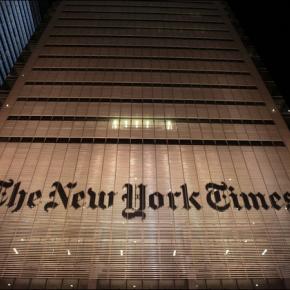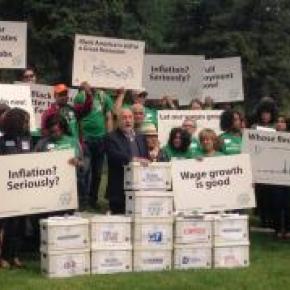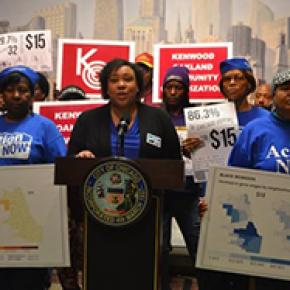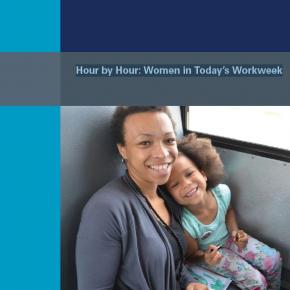The New York Times Comes Out Against Fed Interest Rate Hike
Progressive activists opposed to a Federal Reserve interest...
Progressive activists opposed to a Federal Reserve interest rate hike gained an influential new ally on Labor Day: The New York Times editorial board.
In a Monday editorial, entitled “You Deserve a Raise Today. Interest Rates Don’t,” the Times argued that if the Federal Reserve raises interest rates in the near term, it could slow job creation at a time when there are still too few jobs to generate substantial wage growth.
“Wage stagnation is a clear sign that the economy is not at full employment, which means it needs loose monetary policy, not tightening,” the Times wrote.
The Times called the Fed a “crucial player” in efforts to undo the decades-long trend of worker wages not growing in sync with the broader economy. The paper noted that from 1973 to 2014, median worker pay rose 7.8 percent while overall productivity increased by 72 percent, a finding published Wednesday in a report from the liberal-leaning Economic Policy Institute.
An interest rate hike would exacerbate, rather than reverse, this trend by slowing wage growth, the Times editorial suggested. The paper also said that an interest rate hike would send “the wrong signal of economic health,” undermining efforts by advocacy groups to raise workers’ wages through measures like increasing the minimum wage.
It is unclear what impact the Times’ editorial will have on the Fed’s decision-making, but it is a high-profile boost for progressive activists and economists, who have long argued that a Fed interest rate hike should be tied to wage growth that is about twice as high as it is currently.
These activists, led by the Center for Popular Democracy's Fed Up campaign, note that even as the official unemployment rate declined to 5.1 percent in August -- its lowest level since April 2008 -- wages have grown 2.2 percent in the past 12 months, only marginally outpacing increases in living costs. Since wages rise when demand for workers is high enough that businesses must compete for labor, many economists attribute ongoing sluggish wage growth to the number of people who are underemployed or have given up looking for work -- figures masked by the low official jobless rate.
The Fed Up campaign sent a memo to newspaper editorial boards across the country on Sept. 1, asking them to oppose an interest rate hike in 2015. The memo, a copy of which was obtained by The Huffington Post, employs arguments that resemble those used by The New York Times. The memo warned that an interest rate hike in 2015 would "leave millions in considerable andunnecessary economic distress and would exacerbate troubling longer-term trends in wages and incomes for the vast majority of American workers and their families."
Fed Up campaign director Ady Barkan celebrated the editorial, but stopped short of claiming credit for it.
"The New York Times Editorial Board is right," Barkan said in a statement. "Workers do deserve a raise! The data is crystal clear – stagnant wages and the lack of inflation mean that the Fed shouldn’t raise rates anytime soon. The Fed Up campaign is of course glad that the Times and other leading voices are speaking up about this issue."
Fed officials have signaled for months that they plan to raise the current near-zero interest rates before the year’s end, but William Dudley, president of the Federal Reserve Bank of New York, recently indicated that a September increase may be too soon in light of market fluctuations. The Federal Open Market Committee, the central bank body charged with adjusting key interest rates, will report on whether it plans to raise rates on September 17.
Supporters of an interest rate hike argue that it is necessary to head off excessive price inflation, which, along with maintaining full employment, is part of the Fed’s dual mandate.
Source: Huffington Post
Nueva York mantiene su promesa de apoyar a víctimas de María
Julio López Varona, director de campañas del Centro para la Democracia Popular (CPD), destacó que aunque es cierto que...
Julio López Varona, director de campañas del Centro para la Democracia Popular (CPD), destacó que aunque es cierto que el Gobierno federal no ha tratado a los damnificados con ninguna consideración y ha fallado en su obligaciones, la responsabilidad de velar por el bienestar de las víctimas cae en el Estado y los municipios donde ahora residen, por lo que exigió más acciones.
Lea el artículo completo aquí.
D-FW activists travel to annual Fed summit in Jackson Hole, Wyo., to spread their message
Lemlem Berhe is one of a handful of activists from the Dallas-Fort Worth area visiting Jackson Hole, Wyo., in hopes of...
Lemlem Berhe is one of a handful of activists from the Dallas-Fort Worth area visiting Jackson Hole, Wyo., in hopes of getting their message heard. That message: Raising interest rates now would stunt wage growth and hurt working families and communities of color.
“Fed officials think the economy has recovered enough to raise interest rates, slowing down job and business growth, but working families like mine in Dallas know otherwise,” Berhe said. “That’s why we’re in Wyoming this week, to ask them to prioritize job growth and higher wages.”
As part of the national FedUp Coalition, local members of the Texas Organizing Project and the Workers Defense Project are in Wyoming for the Federal Reserve’s annual summit, where the world’s most powerful central bankers discuss economic policies that affect people everywhere. The top U.S. banker — Fed chairwoman Janet Yellen — is not attending the event, which began Thursday and ends Sunday.
This is the first time anyone from either group has traveled to the Fed’s annual summit in Jackson Hole.
This year’s Jackson Hole Economic Policy Symposium comes as the Fed faces a difficult decision on when to start raising interest rates, rising debates on income inequality and wages, and worries about slowing Asian economies, most notably in China.
With the U.S. unemployment rate at 5.3 percent in July, some say it’s time to raise interest rates, which have been near zero for nearly seven years. Recently, some economists and one Fed banker have called for a delay given concerns about slower global economies.
On Friday, the organizing groups in Jackson Hole held a public demonstration and teach-ins on topics such as full employment and the selection process for regional bank presidents, with renowned Columbia University economist Joseph Stiglitz. Today, he wrote an op-ed column in the Los Angeles Times about why the Fed should not raise interest rates.
In addition, the Texas Organizing Project also made a second request in a video posted to its Facebook page and in a tweet to meet with Robert Steven Kaplan, the newly named president of the Federal Reserve Bank of Dallas, soon after he starts his new job on Sept. 8. Kaplan is attending the summit.
Kaplan will replace Richard Fisher, who retired in March after a decade leading the Dallas Fed. Last week, immediately after the regional bank named Kaplan, the Texas Organizing Project suggested he meet with some of its members in Dallas once he arrives.
Earlier this year, the group and the FedUp Coalition asked to meet with Dallas Fed board members to seek more openness and participation in the search process for Fisher’s replacement. Their request was denied, but a meeting was arranged with two bank officials. I wrote about it.
FedUp claims that full employment is when the nation’s unemployment rate is 4 percent or lower. If that was the case this year, the Dallas economy would be $19.9 billion stronger at $476.8 billion, it would have 204,300 more workers employed, which would mean 162,500 fewer people would live in poverty.
In addition to Berhe, two other Texas Organizing Project representatives in Jackson Hole are from Dallas: member Nayeli Ruiz, 21, and community organizer Kenia Castro.
The Austin-based Workers Defense Project has two D-FW representatives in Jackson Hole: AdanArostegui andElliott Navarro.
“We believe that our members should be involved and learn what the Fed does,” said Diana Ramirez, a community organizer for the Workers Defense Project in Dallas. “No one really knows.”
Source: Dallas Morning News
Attorney general reaches agreement with companies to stop on-call scheduling

Attorney general reaches agreement with companies to stop on-call scheduling
Several major retailers across the state and in Western New York have agreed to end on-call shift scheduling. The...
Several major retailers across the state and in Western New York have agreed to end on-call shift scheduling.
The announcement came from Attorney General Eric Schneiderman, who has worked with attorneys from several states to secure the agreement. The six major retailers agreeing to stop the practice include Aeropostale, Carter’s, David’s Tea, Disney, PacSun and Zumiez.
On-call scheduling requires employees to call their employers an hour before their shift starts to find out if they will be assigned to work that day. If the workers are not scheduled, Schneiderman says they are not compensated for their time, despite being required to keep their schedule open.
“On-call shifts are not a business necessity and should be a thing of the past,” said Schneiderman in a press release. “People should not have to keep the day open, arrange for child care, and give up other opportunities without being compensated for their time.”
The agreement comes after the attorney general sent out a letter earlier this year, detailing the challenges employees face with the on-call scheduling system.
The letter read in part, “Without the security of a definite work schedule, workers who must be ‘on call’ have difficulty making reliable childcare and elder care arrangements, encounter obstacles in pursuing an education, and in general experience higher incidences of adverse health effects, overall stress, and strain on family life than workers who enjoy the stability of knowing their schedules reasonably in advance.”
The AG’s office also requested documents relating to the companies’ use of on-call shifts.
In addition to ending the use of on-call shifts, Carter’s, Disney, David’s Tea and Zumiez’s have agreed to provide their employees with their work schedule one week in advance.
The AG’s office says the companies were able to find alternative methods for staffing stores during an unexpected employee absence or during a slow time for businesses.
“This latest announcement shows the sweeping positive impact that Attorney General Schneiderman's actions have had on the lives of people working in retail,” said Carrie Gleason, director of the Fair Workweek Initiative at the Center for Popular Democracy. “Today, we are seeing retailers across America take steps to curb unnecessary and unfair on-call scheduling.”
In 2015, as a result of an inquiry by Schneiderman into on-call scheduling, stores including Abercrombie & Fitch, Gap, J.Crew, Urban Outfitters and Pier 1 Imports all agreed to end the practice of assigning on-call shifts.
Source
Report: Emanuel's $13 Minimum Wage Plan Would 'Shortchange' Women, Minority Workers
Progress Illinois - October 29, 2014, by Ellyn Fortino - Chicago Mayor Rahm Emanuel's proposal to lift the city's...
Progress Illinois - October 29, 2014, by Ellyn Fortino - Chicago Mayor Rahm Emanuel's proposal to lift the city's hourly minimum wage to $13 would leave out approximately 65,000 low-wage workers who are mostly women and people of color.
That's according to a new Center for Popular Democracy report, which compared the potential impacts of the mayor's $13 minimum wage plan with a competing $15 minimum wage ordinance introduced in late May by a group of aldermen, including members of the council's Progressive Reform Caucus.
The proposed $13 ordinance specifically "shortchanges" domestic and tipped workers, the majority of whom are women of color, according to the report.
The Raise Chicago coalition, which supports the $15 plan, released the report's findings at a City Hall press conference Wednesday morning. More low-wage Chicago workers would be covered by the $15 plan, which would also almost double the economic impact for the city compared to the $13 measure, the report found.
"With the opportunity to nearly double the economic growth of people across the city, our Raise Chicago ordinance would help propel people towards financial stability, help this city and state with tax revenues, and its effects would ripple through every community in Chicago," said Action Now Executive Director Katelyn Johnson, a Raise Chicago leader. "The mayor's proposal does not do enough to address the needs of Chicagoans and, in fact, will keep people living paycheck to paycheck."
In July, Emanuel, along with 25 other aldermen, introduced an ordinance to bump the city's hourly minimum wage from the current $8.25 to $13 by 2018.
The measure models the recommendations of the mayor-appointed Minimum Wage Working Group, which was tasked with researching and gathering public comment about increasing the city's minimum wage. The mayor formed the commission the same month the ordinance seeking to hike Chicago's base wage to $15 an hour by 2018 was introduced.
Under the mayor-backed ordinance, the city's minimum wage for non-tipped employees would increase by $1.25 in each of the next three years and $1 in 2018 to hit the $13 level. The city's minimum wage would be adjusted each year after 2018 to keep pace with inflation. The tipped minimum wage, which is currently $4.95 at the state level, would be lifted by $1 to $5.95 over two years and indexed to inflation after that.
The $15 plan, on the other hand, would require large employers in Chicago making at least $50 million annually to raise their employees' wages to $12.50 an hour within 90 days. Those companies would then have to raise workers' hourly wages to the $15 level within one year of the measure taking effect.
Businesses with less than $50 million in annual revenue would have a different minimum wage phase-in period. Small and mid-sized businesses would have to increase their base hourly wage to $12 within 15 months. After that, the smaller employers would have to increase their minimum wage by $1 each year until they hit the $15 level by 2018.
Johnson said the mayoral working group's measure "burdens small businesses," because it provides "no separate phase-in period for large corporations and small businesses."
The city's minimum wage under the $15 proposal would be adjusted each year after 2018 to keep pace with inflation. If that plan were adopted, the base hourly wage for tipped workers would be 70 percent of the overall minimum wage.
Tipped workers under the $15 ordinance would earn a $10.50 hourly wage once the phase-in process is completed. That wage would be 63 percent greater than what the $13 plan proposes.
Domestic workers, meanwhile, are covered by the Raise Chicago minimum wage ordinance, but they're excluded from the $13 proposal.
"This exclusion would have a disparate impact on women of color, who make up the majority of domestic workers in Chicago," the report reads.
Ovadhwah "O.J." McGee, a Chicago home care aid and SEIU* Healthcare Illinois member, said workers who provide supports to seniors and those with disabilities, for example, deserve a living wage. McGee, a single father who is also a certified nursing assistant, said he earns less than $13 an hour and struggles to make ends meet. He said "$15 would make such a great difference for me."
"The mayor's proposal will leave domestic workers behind. They wouldn't even get the $13 an hour, and that's an injustice," McGee said, adding that the $13 ordinance also "shortchanges tipped workers, providing them with only a $1.50 wage increase."
"That's a shame," he stressed. "The reality is by leaving domestic and tipped workers behind, the mayor is leaving workers of color behind. The majority of these jobs are ... held by African Americans and Latino workers."
Nearly 40 percent of the city's more than 1.3 million workers living in Chicago make less than $15 an hour, according to the report, which also estimated the total number of workers who would see their wages lifted, either directly or indirectly, by the two proposals.
"Under the $15 proposal, we project that 444,000 workers earning up to $17.30 will receive wage increases related to raising the wage floor," the report states. "Under the $13 proposal, only those workers currently earning up to $15.60, or about 379,000 workers, would receive higher wages."
The $13 measure would leave out 65,000 low-wage workers, including 42,000 Chicago residents, according to the report. Of the 65,000 low-wage workers who would be excluded from the $13 plan, approximately 13,000 are African American and 20,000 are Latino.
Additionally, the mayor's $13 measure "fails to secure the truly robust economic recovery that the $15 Raise Chicago ordinance would achieve," the report reads.
After full implementation, the $15 proposal would generate $2.9 billion in new gross wages; $1.04 billion in new economic activity and 6,920 new jobs; more than $80 million in new sales tax revenues; and $125 million in new income tax revenues, the report found.
On the flip side, the $13 plan would lead to $1.25 billion in new gross wages; $522 million in new economic activity; and $40 million in new sales tax revenues.
"Our research found that the benefits of a $15 minimum wage far outweigh those of the mayor's proposed $13," Connie Razza, director of strategic research at the Center for Popular Democracy, said in a statement. "At a time when income inequality is at historic levels and American communities are still reeling from the financial crisis, two dollars more may well be the threshold between survival and stability."
"For Chicago, it means over half a billion more dollars in economic activity that would benefit small businesses and communities, millions more in tax revenue for the city, and would significantly raise the wage floor," she added.
During the March 18 primary election, Chicago voters overwhelmingly supported a non-binding ballot referendum to increase the city's minimum wage to $15 an hour for employees of companies with annual revenues over $50 million. The referendum appeared on the ballot in 103 city precincts, garnering support from about 87 percent of voters.
"The time to raise the minimum wage to $15 an hour is now, and no half measurers will be accepted," Johnson stressed.
Source
Immigration Advocates Praise de Blasio's Proposal for Municipal ID Program
Immigration advocates are praising Mayor Bill de Blasio's proposal for a municipal ID program. In his State of...
Immigration advocates are praising Mayor Bill de Blasio's proposal for a municipal ID program.
In his State of the City address, de Blasio said that the city would make ID cards available to all New Yorkers.
That includes people who usually can't get other forms of identification, like the homeless and undocumented immigrants.
On Tuesday, the Center for Popular Democracy released a report analyzing similar programs in other cities.
Advocates say that the program could be a big help to vulnerable populations.
"Without this ID, it can be difficult to register to a child for school. It can be difficult to open a bank account. It can be difficult to even exercise your right to vote, to file a complaint with the police department," said Brittny Saunders of the Center for Popular Democracy.
"We also want to make sure that this card is available to multiple constituencies in this city," said City Councilman Carlos Menchaca of Brooklyn. "There's so many constituencies in this city that can benefit from this card, so we want to make sure that we know all those so we design the best cards that everyone has it."
Menchaca, who is the immigration chair for the City Council, also said that the Council plans to hold hearings in the next month about the best way to design the program.
Source
Nationwide protests against Trump’s family separation policy planned for June 30

Nationwide protests against Trump’s family separation policy planned for June 30
The Women’s March is also organizing a nonviolent civil disobedience in partnership with Center for Popular Democracy...
The Women’s March is also organizing a nonviolent civil disobedience in partnership with Center for Popular Democracy and CASA in Action event for Thursday, June 28, in Washington, DC. The organization is asking women if they’re ready to risk arrest — and will provide training to those willing to participate.
Read the full article here.
'Freedom city'? Going beyond 'sanctuary,' Austin, Texas, vows to curtail arrests

'Freedom city'? Going beyond 'sanctuary,' Austin, Texas, vows to curtail arrests
While Austin is among the country’s first so-called freedom cities, it’s part of a wider movement around...
While Austin is among the country’s first so-called freedom cities, it’s part of a wider movement around decriminalizing low-level offenses and decreasing arrests. According to Local Progress, a national network of progressive city officials, some council members in El Paso and Dallas are also considering “freedom city” proposals.
Read the full article here.
Hour by Hour: Women in Today’s Workweek
Nationwide, more than 38 million women work in hourly jobs. Most women, and most Americans, are paid by the hour, yet...
Nationwide, more than 38 million women work in hourly jobs. Most women, and most Americans, are paid by the hour, yet today’s workweek is changing—the 40 hour workweek and the 8-hour day are no longer the norm for a significant part of this workforce.
Our nation’s workplace protections are badly out of sync with the needs of today’s working families and we need policies that provide everyone an opportunity to get ahead. Particularly, labor standards have not kept up with rapid changes to the fastest growing industries like retail, healthcare, and food service. Part-time workers in the service sector—overwhelmingly women—have borne the greatest burden of these new just-intime scheduling practices, which have largely gone unregulated. But what begins in these sectors will soon spread, as the distinctions between part-time and full-time work grow increasingly blurred, and more and more Americans experience work hour instability and economic uncertainty.
Women − over a third of whom work part-time in order to juggle economic survival, family responsibilities, and advancing their careers − are at the greatest risk of being further marginalized in the workforce if unsustainable scheduling practices on the part of employers go unchecked. As we seek to create family-sustaining jobs in the burgeoning service sector, we must also consider scheduling practices in low-wage employment. Without an update to labor standards for these workers, more and more workers across the economy will be subject to this type of extreme economic uncertainty. New policies that ensure predictable schedules, give employees a voice in their schedules, ensure quality part-time employment and access to stable, full-time schedules will improve the lives of working people in general and especially benefit working women and mothers.
Download the full report
OPPOSING A MINIMUM WAGE HIKE COULD COST THE GOP THE SENATE
Labor Day has started the sprint to the November election. And with more than 40 percent of U.S. workers struggling on...
Labor Day has started the sprint to the November election. And with more than 40 percent of U.S. workers struggling on less than $15 an hour, our economy’s tilt toward low-paying jobs has become a top economic issue this year.
Now, as GOP leaders fret that Donald Trump may drag down Republican incumbents, turning more U.S. Senate races into toss-ups, the Republican majority’s stonewalling of any action to raise the federal minimum wage could cost the party control of Congress.
New polling shows that close to 70 percent of voters in key swing states want an increase in the federal minimum wage—and that 60 percent or more support a $15 minimum wage in six of the seven states polled.
Try Newsweek for only $1.25 per week
Even more, the polling shows that candidates’ positions on raising pay could play a pivotal role in this year’s electoral battles for control of the U.S. Senate. The results show that the incumbent Republican U.S. senators locked in close races could lose critical support—and even their seats—over opposition to raising wages for working people.
In Pennsylvania, Wisconsin and New Hampshire, Democratic challengers Katie McGinty, Russ Feingold and Governor Maggie Hassan strengthened their leads over incumbent Republican Senators Pat Toomey, Ron Johnson and Kelly Ayotte when voters were made aware of the senators’ opposition to raising the minimum wage.
And in Arizona, Missouri and North Carolina, Democratic challengers Representative Ann Kirkpatrick, Jason Kander and Deborah Ross pulled ahead of Senators John McCain, Roy Blunt and Richard Burr, flipping those contests on their heads, when voters learned of the senators’ track records opposing raises.
For example, in Arizona—where John McCain has just emerged from his toughest re-election primary ever—a 43-43 tie turns into a 44-38 lead for Kirkpatrick once voters hear about McCain’s opposition to raising pay.
The polling comes as the National Employment Law Project Action Fund, the Center for Popular Democracy Action, the Working Families Organization and other grassroots groups in seven states begin to mobilize voters.
The coalition plans to engage in canvassing, hold candidate forums and wage debate protests, among other actions, to educate and energize voters around candidates’ positions on the raising the minimum wage.
While Donald Trump, who has been all over the map on the minimum wage, has announced he now supports an increase to $10, most Republicans in Congress remain opposed.
Leading Republican pollster Frank Luntz’s firm LuntzGlobal has warned minimum wage opponents, “If you’re fighting against the minimum wage increase, you’re fighting an uphill battle, because most Americans, even most Republicans, are OK with raising the minimum wage.”
Farm workers pick vegetables on a farm in Rancho Santa Fe, California, on August 31. Paul Sonn writes that Republican U.S. senators locked in close races could lose their seats over opposition to raising wages.
While Congress has refused to act, over the past three and a half years, more than 50 states, cities and counties, as well as individual companies, have stepped forward to approve minimum wage increases, delivering raises to 17 million workers.
And 10 million of those workers are in states or cities that have approved phased-in $15 minimum wages, raising pay for more than one in three workers in California and New York and beginning to reverse decades of growing pay inequality.
Historically, raising the minimum wage enjoyed the same bipartisan backing in Congress that it does with voters. But over the past 20 years, increasing polarization in Washington and the growing role of money in politics have led many Republicans to abandon their support.
As a result, the federal minimum wage today remains frozen at just $7.25 an hour. And taxpayers are being forced to pick up the tab, as low-wage workers in the seven states just polled must rely on $150 billion per year in public assistance to make up for their inadequate paychecks.
Candidates’ positions on the minimum wage have made a difference in close U.S. senate races before. Ten years ago, in Missouri and Montana, Democrats Claire McCaskill and Jon Tester successfully used their support for a higher minimum wage to highlight the difference between them and their opponents, Republican Senators Jim Talent and Conrad Burns, who both opposed raising the wage.
McCaskill and Tester rode the issue to an Election Day victory, helping to break a logjam in Congress and delivering the first federal minimum wage increase in 10 years in 2007.
With the public demanding action to boost pay, the Republican majority and individual candidates this fall face a clear choice: stop standing in the way of a long overdue federal minimum wage increase—or risk their political future.
By Paul K. Sonn
Source












9 days ago
9 days ago